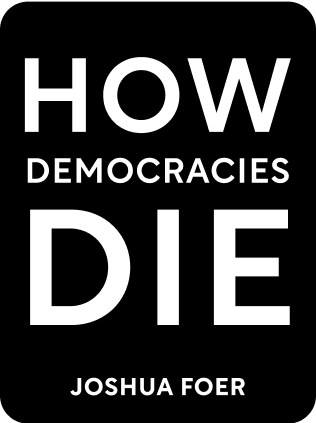

This article is an excerpt from the Shortform book guide to "How Democracies Die" by Steven Levitsky and Daniel Ziblatt. Shortform has the world's best summaries and analyses of books you should be reading.
Like this article? Sign up for a free trial here .
Will democracy survive? What can be done to prevent America from democratic backsliding?
According to Levitsky and Ziblatt, the authors of How Democracies Die, American democracy is going to face strong challenges. The authors present three key factors that they believe will determine whether or not democratic norms survive in American politics: 1) the behavior of party leaders (particularly Republicans), 2) public opinion, and 3) the possibility of crises like war or terrorist attacks.
We’ll discuss the implications of each below.
1. The Behavior of Party Leaders
As the authors have argued, political parties are the best gatekeepers of democracy. Whether democracy will survive or backslide, therefore, depends to a great extent on the behavior of party leaders. According to them, party leaders have three options when dealing with an authoritarian in their own ranks:
- Loyalty
- Containment
- Confrontation
There are a few ways for parties to remain loyal to authoritarian leaders. They can actively enable the autocrat by willingly repeating his lies, amplifying his attacks, and vigorously defending him against opponents. Or they can more passively empower him, either by remaining silent on his most aggressive violations of democratic norms, or issuing only mild criticisms without taking any concrete action.
Alternatively, party leaders might opt for a containment strategy, in which they side with the leader on traditional matters of party orthodoxy, but draw a line against the more egregious democratic norm-breaking. Thus, argue Levitsky and Ziblatt, a Republican Congress pursuing a containment strategy might vote for Trump’s tax cuts, but oppose his efforts to politicize federal law enforcement.
But, they warn, this “have one’s cake and eat it too” strategy is usually difficult to maintain, as party leaders know that their own political fortunes are tied to the success of the leader’s initiatives—and this is especially true in a highly polarized political environment like in the present U.S. If they stymie him too much, they will pay a political price. But by giving him victories on legislative matters, they help make him more popular with the public, which only increases his authoritarian power.
Lastly, party leaders can opt for a confrontation strategy. This would entail the party actively mobilizing and crossing party lines to remove the leader through the impeachment process or calling on him to resign.
| Republicans, Impeachment, and Accountability for Trump In 2019, it was revealed that the Trump administration had threatened to withhold military aid from Ukraine in order to pressure the Ukrainian government into launching an investigation into the business dealings of Hunter Biden, son of Trump’s Democratic rival (and ultimate successor) Joe Biden. Based on the GOP’s steadfast support for Trump during this affair and their near-unanimous vote against the resulting impeachment charges in both the House and Senate, it could be argued that the party coalesced around a strategy of active collaboration with Trump. This trend continued into 2021, when Trump was impeached for a second time—a first in U.S. history—on charges related to the riotous and violent January 6, 2021 insurrection in which a mob of Trump supporters stormed the Capitol complex in an attempt to overturn the election. The impeachment vote held on January 13, 2021 (a week before Trump left office) saw nearly all House Republicans oppose the charges against Trump, with only 10 out of 211 Republicans voting for impeachment. In the Senate vote held a month later on February 13, 2021 (three weeks after Trump had left office), just seven out of 50 Republicans voted to convict the former president. |
2. Public Opinion
The second major factor cited by Levitsky and Ziblatt is public opinion. They argue that the more popular an authoritarian is, the more successful they will be in destroying democracy. Authoritarians are strengthened—and their opponents demoralized—when public opinion is on their side. When they choose to enable the leader’s norm-breaking behavior, high-ranking party officials can play a significant role in boosting his popularity by signaling to the public that the opposition to him is merely partisan. Of course, approval ratings are also influenced by the state of the economy and external events like wars and terrorist attacks, over which political leaders have less direct control.
| Trump’s Approval Ratings If we are to accept Levitsky and Ziblatt’s argument that an authoritarian leader’s popularity is a strong predictor of how successful they will be at dismantling democracy, it appears that this particular democratic guardrail—public opinion—held up quite well during the Trump administration. With the benefit of hindsight, we can take a deeper look at Trump’s overall standing with the public than the authors could have in 2018. Trump left office with a poor 34% approval rating, largely owing to his perceived mishandling of the COVID-19 pandemic and the ensuing economic fallout. Perhaps more notably, he finished with an average approval rating of 41% over the entire course of his administration—the lowest of any president since the advent of polling. |
3. External Crises
The third factor that Levitsky and Ziblatt contend will determine the survival of U.S. democracy is external crises like terrorist attacks or wars. In the aftermath of such events, they argue, a “rally-around-the-flag” effect tends to boost public support for the government.
The entire political system, including judges, law enforcement, and legislatures, tends to bend to the will of the executive under these circumstances, granting them extraordinary powers and deference. From Abraham Lincoln’s suspension of constitutional rights like habeas corpus during the Civil War to Franklin Roosevelt’s internment of Japanese-Americans during World War Two, presidents have enjoyed greatly expanded powers during times of crisis.
But while these were extraordinary acts from leaders who were otherwise strongly committed to democratic norms, the authors argue that Trump could not be trusted to wield such powers responsibly. A national emergency could provide a dangerous opportunity for him to mount an effective assault on America’s already-weakened democratic norms.
| Trump and the COVID-19 Crisis Although Levitsky and Ziblatt couldn’t have foreseen it, just such a crisis—the COVID-19 pandemic—did befall the U.S. in the last year of Trump’s term. The first U.S. case was diagnosed in January 2020 and as of April 2021, over 570,000 had died as a result of the pandemic. The spread of the disease wrought major social and economic changes, as workplaces, recreational venues, and other public spaces were ordered closed by state and local governments across the country and 14 million Americans lost their jobs—sending the unemployment rate to 13%, higher than it ever reached during the Great Recession. Yet, Trump did not enjoy the surge in public support that Levitsky and Ziblatt’s model would seem to predict. On the eve of the 2020 presidential election, just 37% of Americans approved of his handling of the crisis, compared to 59% who disapproved. Moreover, Trump didn’t seize the moment of the crisis to consolidate his own political power. In fact, he forcefully spoke out against what he saw as restrictions on Americans’ liberties, including mask mandates and bans on public gatherings. |

———End of Preview———
Like what you just read? Read the rest of the world's best book summary and analysis of Steven Levitsky and Daniel Ziblatt's "How Democracies Die" at Shortform .
Here's what you'll find in our full How Democracies Die summary :
- How shared norms are essential for preserving democracy
- Why the Trump presidency threatened those shared norms
- Why democracy goes beyond individual leaders and parties and must be a shared enterprise among committed individuals






